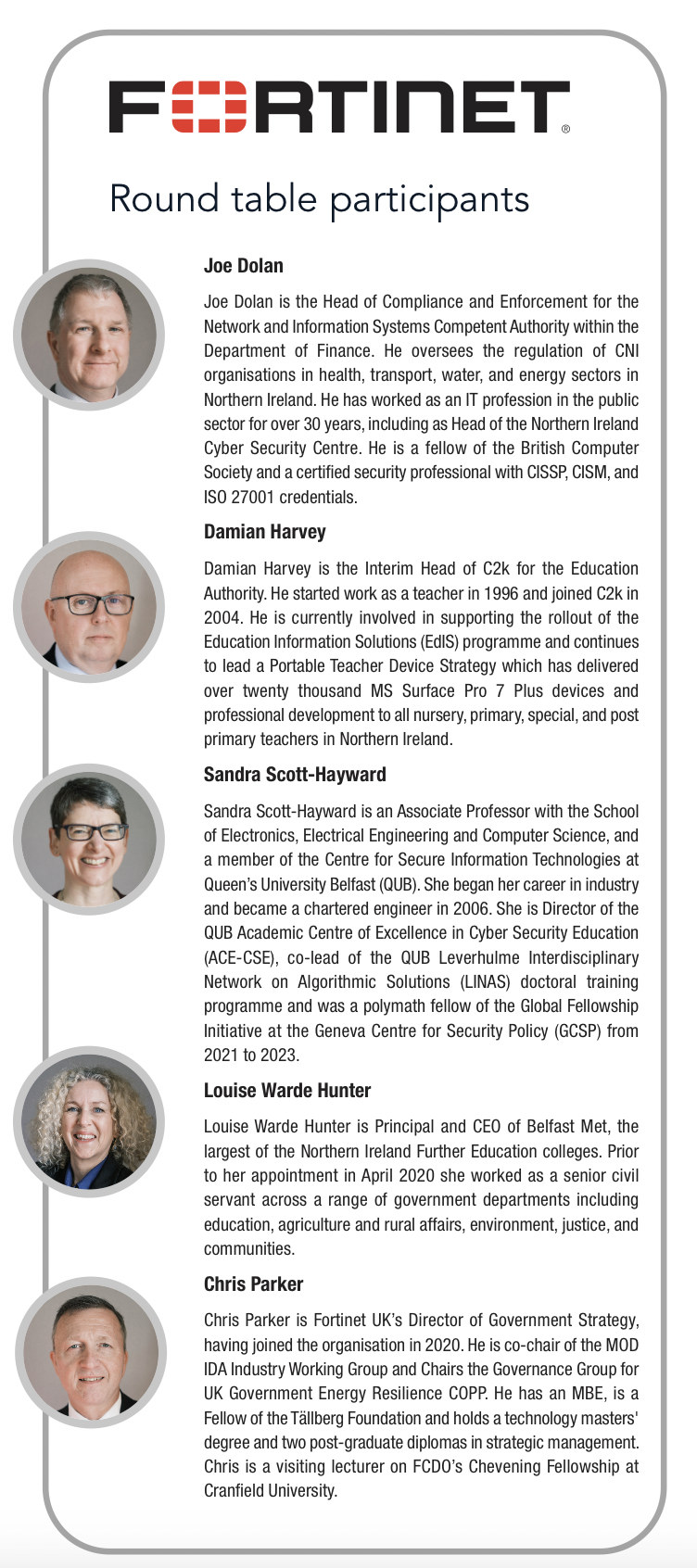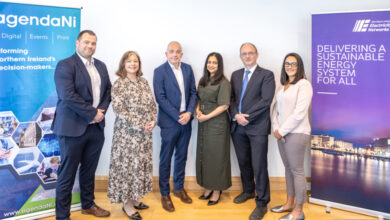Educating for a secure and growing economy

Fortinet hosted a round table discussion with key stakeholders in the cybersecurity and education sectors to discuss the importance cybersecurity plays today in protecting the economy of the future.

How has the acceleration of digitalisation changed the threat landscape for organisations across the economy in recent years?
Chris Parker
Digital transformation has accelerated at a rapid pace, meaning that so too has the cyber threat to organisations. One of the major changes Fortinet has observed in the past five to seven years is the need for a shift from security of networks to security driven networking. Traditional security tools can no longer provide the consistent security that networks require. Cars provide a good analogy for the current landscape. On our roads there are vehicles which are modern, efficient, and of the highest safety specifications, but there are also legacy cars, which are older, less efficient, have problems, but enable the user to complete their journey. Ultimately, Fortinet wants everyone to have the best ‘vehicle’ because the threat level demands it, but we know that there are time and resource barriers. The challenge, therefore, lies in transitioning the whole of society to be best protected and prepared against threats.
Lousie Warde Hunter
The pandemic required many organisations to pivot their services to incorporate a digital offering which inevitably increased the surface area which bad actors could attack. The impact on Belfast Metropolitan College was twofold. Firstly, from an organisational perspective, we had to ensure that our systems were secure. Secondly, as an education and skills provider, we recognised our role in enhancing our provision of a pipeline of skills and qualifications that would be required by industry.
Damian Harvey
Our schools often reflect our wider society and we have moved to a world where we are now immersed in technology. In the 1990s someone had the foresight to ensure technological equity across every school in Northern Ireland and that has been really advantageous. C2k is responsible for providing these schools with internet and other services, enabling us to provide a single solution and a platform for technology to educate our young people. The provision of a single solution has also allowed us to de-risk the cybersecurity arena within our schools because the solution eliminates the need for a single technician to manage cyber threats.

“The earlier we can cultivate awareness of good cybersecurity practices among young people, the more we can build an implicit security understanding for life-long development.” Sandra Scott-Hayward
Sandra Scott-Hayward
Accelerated digitalisation has lowered the bar for malicious actors to access cheap tools to launch an attack. Small businesses are particularly vulnerable as they are drawn into digitalisation of their services e.g., online payment methods and client information databases that can be targeted, and for which they may not have the security protections. The increasing threat landscape means that organisations now need to prepare for an attack on a ‘when’ rather than an ‘if’ basis. Cybersecurity training needs to include planning and preparation for recovery from an attack or incident.
Joe Dolan
In a single generation, we have become a society from using modems to one which embraces ubiquitous global WiFi and connectivity. This poses challenges because while there are some organisations which have the agility to invest in cybersecurity solutions, there are others, including critical national infrastructure, which have 30- to 50-year investments in assets which also need protected. Similarly, we have evolved from tightly controlled on-premises connectivity to cloud service adoption, making it very difficult for organisations to define their security boundaries, particularly when considering supply chain threats. If we want to successfully defend against threats to a modern society, there is a need for us to fully understand the technologies we are using, how we are using them, and to bring society along with us on that journey.
What is the role of early education in enhancing cyber protection?
Sandra Scott-Hayward
Educators have a role in developing the pipeline of knowledge and skills required by the growing cybersecurity sector. However, there is also a role in enhancing the knowledge and awareness of the population as a whole, such is the reach of technology in every aspect of our lives. The earlier we can cultivate awareness of good cybersecurity practices among young people, the more we can build an implicit security understanding for life-long development.
Louise Warde Hunter
Children are innately curious and creative and that should be harnessed. If we can cultivate safeguarding practices for children and young people navigating their tech-enabled world, then they will have a very strong basis for ethical practices as they enter the world of work. Educators have a role in cultivating ‘digital citizens’ because while not everyone will enter the cyber industry, many will go into a working environment where the protection of data is critical.
Joe Dolan
Our education system has a healthy focus on cyber safety training but not on cybersecurity and it’s an opportunity missed in development of this life skill. We also have a massive opportunity to leverage cyber education at an early age to enhance our economic competitiveness. Cybersecurity is a discipline that touches everything we do, irrespective of the sector, and if we can be better at informing pupils and parents around the career opportunities, then we can get more people into this space across all sectors.
Damian Harvey
In recognition that children have technology in their hands from an increasingly early age, the new EdIS programme is bringing nursery schools into the conversation. The expectation of technology access from our young people is changing and we want to cultivate the curious and creative side of our young people in a safe environment.

“The pace of change is so rapid that the skill level and resources of those whose core business is to educate cannot keep up alone. In the spirit of true collaboration, industry must lean in and help.” Chris Parker
Chris Parker
I believe awareness of the importance of early education is growing within the education sector, but also within industry. Fortinet staff are required to engage in monthly training to stay ahead of the technology, so how can we expect educators, many of whom are digital migrants, to keep pace with best practice? Acknowledging this, Fortinet recently launched an education-focused version of its Security Awareness and Training service and has made it available for free to all primary and secondary schools across the UK. Industry has a role in partnering and helping society through the education sector and there is a huge opportunity to capitalise on such partnerships locally.
How can educators be best equipped to share cybersecurity best practice?
Chris Parker
There is a moral imperative on cybersecurity organisations who are benefiting from the pace of digital transformation to be reciprocal. The pace of change is so rapid that the skill level and resources of those whose core business is to educate cannot keep up alone. In the spirit of true collaboration, industry must lean in and help.
Joe Dolan
Expecting educators to layer cybersecurity expertise on top of the services they currently provide and to stay ahead of the curve, is a big ask. The only way this is viable is in true partnership with industry. Curriculum change can be a slow process, which is not conducive to the pace of digital change. As such, we must establish the fundamentals of what schools should deliver, and then utilise the expertise of industry to layer on those additional skills. If we can do this in an engaging and enriching way, we sustain the interest of young people into the future, irrespective of what new technology comes along and for everyone’s benefit.

“We have a strong message to sell the world in the form of our single education technology solution.” Damian Harvey
Damian Harvey
Teachers cannot be expected to be cybersecurity experts. However, what we have found is that the workforce can play a leading role in designing and delivering best practice. Through our delivery of teachers’ professional learning, we have aligned leading practitioners with industry, enabling the co-creation of materials. This ensures both that the needs of industry are met and teachers have material that best suit their needs, in their setting. That collaboration between education and industry is extremely important and very powerful.
Louise Warde Hunter
Belfast Met is the digital IT curriculum hub for the further education sector, where we strive to ensure that best practice is common practice. We do that through collaboration with our five sister colleges and with industry partners. FE leaders know that the best way to support educators in a rapidly evolving space is through continuing professional development for those at the forefront of delivery in partnership with business. At Belfast Met we walk the talk.
Sandra Scott-Hayward
One of the greatest tools for educators to meaningfully share best practice is engaging material. Rapid digital transformation is a challenge, but it is also an opportunity to use that technology to teach best practice. As part of QUB’s Academic Centre of Excellence in Cyber Security Education, we explored the potential to increase the efficacy of cyber security training for third-level students by using immersive experiences supported by virtual reality design. Immersive learning can be more impactful and, though designed for university students, our solution has received interest from schools and industry.
What key qualities must cybersecurity solutions possess to ensure usability across the economy?
Chris Parker
They must match the complexity of the threat, in a landscape that is constantly evolving. However, in doing so they must also be usable. A solution that is so complicated that it restricts the usability will not stand up. Many of the most prominent cybersecurity challenges faced today will not be mirrored in five years’ time because of the role played by automation. Therefore, solution design should be undertaken with an eye to the future. Northern Ireland, with its agility, demographics, and single technology solution approach across schools is well placed to lead on future solutions.
Sandra Scott-Hayward
Solutions must be accessible, which can be best achieved with interdisciplinary design and development. At Queen’s, we have several programmes to address interdisciplinarity in cybersecurity education and research. For example, students of the MSc Applied Cyber Security take a Data, Privacy, and the Law module while LLM Law and Technology students can take Foundations of Cyber Security. Applying different perspectives to cybersecurity solutions provides much richer outcomes.

“There is a need to enhance the understanding of what is needed and what is being offered, so that businesses can make informed investment decisions to meet their needs and better their security.” Joe Dolan
Joe Dolan
Almost 90 per cent of businesses in Northern Ireland’s economy are micro businesses, meaning they have 10 employees or less. The reality is that many of the cybersecurity solutions and training on offer are beyond their financial reach. There is an opportunity for affordable cybersecurity solutions for businesses for industry to package these in a way that makes them accessible. There is a need to enhance the understanding of what is needed and what is being offered, so that businesses can make informed investment decisions to meet their needs and better their security.
Louise Warde Hunter
There is a non-technical aspect to cybersecurity solutions that must be appreciated. The qualifications being delivered must match the needs of industry and have practical application. The best way to ensure this is development in partnership with industry.
Damian Harvey
The best cybersecurity solutions must understand and be tailored to the context in which they are being deployed. All sectors of the economy want a do it ‘with us’ rather than a ‘to us’ approach to solution delivery. The pace of change means that a lot of smaller organisations are now opting for a more managed services solution, but it is worth questioning how agile those services are to the specific needs of the sector you are operating in.
Outline the greatest opportunity increased cyber education for learners can offer the wider economy?
Joe Dolan
Northern Ireland has a strong digital offering with many pathways to succeed. If we continue to get this right we can continue to be seen as a world class provider of digital, IT, and cyber. With the opportunities digital unlocks, we can offer people the opportunity to service the world from this island, which is a fantastic economic opportunity.
Sandra Scott-Hayward
There are high costs from cyber-attacks on businesses and individuals. A less recognised individual cost is wellbeing and mental health implications. A good economy stems from a healthy and educated society.
Damian Harvey
We have a strong message to sell the world in the form of our single education technology solution. Northern Ireland is a global exemplar, but we do not shout loud enough about it. Our unique economic context gives us access to European and global markets. Now is the time to take our world class education technology solution and build a world class economy on top of that.
Chris Parker
The greatest opportunity lies in creating a digitally agile workforce. The future of work may look very different in just a few years from now, especially as automation grows, but if we can build that digital agility in from an early age, the economic opportunities are huge.

“If we can cultivate safeguarding practices for children and young people navigating their tech-enabled world, then they will have a very strong basis for ethical practices as they enter the world of work.” Louise Warde Hunter
Louise Warde Hunter
Digital agility is huge. There is a massive opportunity to promote IT careers that sit outside the IT sector. There is also an opportunity to ensure that cybersecurity becomes a lateral theme across all aspects of education, preparing people for employment in all sectors via a collaborative cross-sectoral approach.






